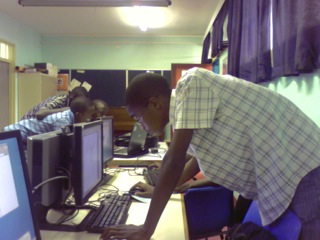 On March 3, 2010, the World Bank launched Urgent Evoke—an online video game designed to help individuals across the world develop innovative, creative solutions to the globe’s most pressing social problems while developing ten much-needed skills: collaboration, courage, creativity, entrepreneurship, local insight, knowledge sharing, resourcefulness, spark / example setting, sustainability, and vision.
On March 3, 2010, the World Bank launched Urgent Evoke—an online video game designed to help individuals across the world develop innovative, creative solutions to the globe’s most pressing social problems while developing ten much-needed skills: collaboration, courage, creativity, entrepreneurship, local insight, knowledge sharing, resourcefulness, spark / example setting, sustainability, and vision.
Category: Blog
Qatar-based Al Jazeera may be completely responsible for the lack of productivity amongst university students, in many different disciplines, all over the world. Walking through the halls of a local university you may hear, at any one point, one student saying to another “Al Jazeera ate my homework.”
The reason for this is what the LA Times has coined Al Jazeera’s ‘CNN moment’ (referring to the network’s coverage of the Gulf War, which catapulted it into popularity). Al Jazeera’s around the clock news and live updated coverage of the protests and revolutions throughout the Middle East and Africa, has in many ways changed the rules of the media game. Al Jazeera has led news media outlets down a path that forces all others to be very conscientious of not only what they report but also in keeping up with real-time events. (more…)
Much of the event data that new technology is making available to practitioners contains geographic information, and to take advantage of this we need a way of thinking about geographic information in a predictive way. Combining today’s post with last week’s “Corralling the Data instead of the Data Corralling Us” post, we get a data filtering methodology that gives us data that is timely and geographically relevant in the field. This will set us up for next week’s post, which will explore how to use time and space filters to maximize the value of software like Swiftriver which significantly speeds the process of data collection and management for project leaders and analysts.
Today marks the 100th anniversary of International Women’s Day, whose priority theme centers around “access and participation of women and girls in education, training, science and technology,” according to this year’s Commission on the Status of Women. Despite the fact that women still earn less than men (about 80 cents per dollar) and are still less likely to hold senior-level positions, the future in technology and social media is looking bright for women. (more…)
Multimedia can be a powerful tool for adult education. When used effectively it can captivate an audience, tug emotions, maintain attention, and contextualize scenario-based learning. But creating and producing quality content also has a number of drawbacks in terms of cost, learning curves, and copyright laws. Integrating multimedia into curricula can have a tremendous impact on the learning process, but are the drawbacks worth the trouble? I’ve compiled this short of list of 6 benefits and 6 drawbacks of multimedia integration from my own experience developing curriculum at the U.S. Institute of Peace’s Academy for International Conflict Management and Peacebuilding. What is your experience? I welcome you to share your experiences and opinions at the bottom of the page.
This past weekend Dr. Michael Gibbons and I taught a 20-hour graduate skills institute at American University’s School of International Service entitled Applications of Technology for Peacebuilding. Students came from a variety of AU programs, including the International Peace and Conflict Program (IPCR) in the School of International Service, the AU Business School, and the AU Law School.
We at TechChange were especially excited about this course, as it allowed us an opportunity to incorporate a variety of new tech-based tools in the curriculum, both those created by TechChange and others. The inclusion of these tools was designed to foster collaboration, allow for course materials to be accessed in innovative, non-linear ways, and to give students an opportunity to participate in hands-on simulations using some of the same tools (e.g. Ushahidi) currently being used by practitioners in the field.
The recent demonstrations in Belarus, Tunisia, Bahrain, and especially Egypt have all recently demonstrated the importance of the Internet and social media as an organizing tool for popular protest. Twitter and Facebook have been crucial tools for organization and mobilization. Governments have noticed this as well, and begun to target the internet. (more…)
